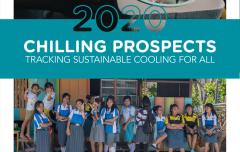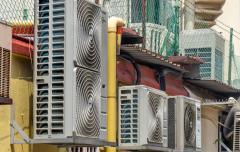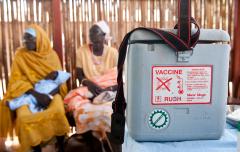Over one billion at risk from lack of sustainable cooling access as COVID-19 intensifies challenge
As the world tries to recover better from the pandemic, access to sustainable cooling is critical to ensure nutrition, health and safety of the most vulnerable.
With significantly higher rates of poverty and malnutrition forecast throughout the year due to COVID-19, a new report from Sustainable Energy for All (SEforALL) shows that without access to sustainable cooling, countries will struggle to fully recover. Chilling Prospects: Tracking Sustainable Cooling for All 2020 finds that over one billion people still lack cooling access, with the pandemic intensifying the challenge ahead just as peak summer temperatures hit for many.
The report looked at 54 countries and finds that 1.02 billion people lack cooling access and remain at high risk, with just 22 million people gaining access to adequate refrigeration, a reliable fan, air conditioning or other solutions since last year’s report. A further 2.2 billion lower-middle income people present another major challenge – they are only able to afford cheaper, less energy efficient air conditioners which will almost certainly increase global energy demand and profound negative climate impacts.
New Chilling Prospects analysis also shows that the developing world will face a significant ‘productivity penalty’ without access to sustainable cooling. The 54 high-impact countries already face an estimated annual economic loss of USD 630 billion due to heat stress, including a USD 301 billion loss in the agricultural sector that many countries rely on for economic development. Evidence also suggests that outdoor and migrant workers, as well as women and girls, are most vulnerable.
As the global community rushes to produce a COVID-19 vaccine, Chilling Prospects highlights the inequities in the vaccine cold chain that resulted in over 13.5 million people in the world’s least developed countries missing a vaccine by April, with an estimated 117 million children at risk of missing another temperature-sensitive vaccine against measles. The report also highlights the need to build cold chains for a COVID-19 vaccine. Close to half of the vaccine candidates currently in Phase 1 or later trials would require storage in a -80°C cold chain, which would require building a new cold chain for low-income countries.
“As the world faces a reset moment from the COVID-19 pandemic, it’s clear that cooling for all is necessary to recover better. We must accelerate access to energy efficient, sustainable cooling solutions that will protect people against the immediate public health and safety concerns caused by the pandemic, as well as support long-term economic recovery,” said Damilola Ogunbiyi, CEO and Special Representative of the UN Secretary-General for Sustainable Energy for All and Co-Chair of UN-Energy.
“Sustainable cooling underpins the Sustainable Development Goals. From access to nutritious food, safe medicines and protection from extreme heat, sustainable cooling is not a luxury – but a critical service needed to deliver a safe, prosperous future for all. As countries seek to recover better from the pandemic, access to cooling must be part of their economic recovery plans.”
This Chilling Prospects data can help states to identify the best solutions for their citizens based on income, temperature and cooling appliance. SEforALL recently published guidelines on how countries can ‘recover better’ from the pandemic by investing in sustainable energy to help close electricity access gaps. This is critical to deliver lifesaving medicines as unreliable electricity further compounds the challenge of powering cold chains, especially in countries across sub-Saharan Africa where only 28% of health facilities have reliable electricity access.
To coincide with the release of the Chilling Prospects report, Sustainable Energy for All has also launched a new campaign to shine a light on innovative sustainable cooling solutions. The ‘#ThisIsCool’ campaign is a celebration of sustainable cooling solutions and aims to bring greater awareness and engagement with solutions that can offer faster progress on global climate and energy goals.
“Cooling for all does not mean an air conditioner or a refrigerator in every home; it means providing more sustainable and affordable solutions to address the needs of the vulnerable without exacerbating the climate crisis or causing a spike in energy demand,” said Brian Dean, Head of Energy Efficiency and Cooling at Sustainable Energy for All. “The good news is there are already a wide range of sustainable cooling solutions that, with the right policy and financial support from governments, can help lower energy demand, reduce GHG emissions, bring better quality of life and deliver faster progress on the Paris Agreement.”
#ThisIsCool will highlight different technologies, solutions and policy and finance measures that can meet growing cooling needs. This will also include a new Cooling for All Solutions Assessment toolkit that will support governments, financiers and communities to provide cooling access that will support healthcare, human comfort and safety, as well as food and nutrition. Showcasing and implementing a range of solutions is essential to build an enabling environment that allows greater investment in sustainable cooling solutions and achieve the long-term benefits of providing cooling for all.
Read more about the new #ThisIsCool campaign on our website here or take part online by using #ThisisCool in social media posts to show your cooling solutions.
Chilling Prospects data continues to draw attention to the direct intersection between three internationally agreed goals: The Sustainable Development Goals; the Paris Climate Agreement; and the Montreal Protocol’s Kigali Amendment. One of the key goals of the Kigali Amendment is to limit consumption and production of hydrofluorocarbons (HFCs), a potent greenhouse gas used widely in air conditioners and refrigerators.
The Chilling Prospects report is produced under SEforALL’s Cooling for All initiative that is supported by the Kigali Cooling Efficiency Program (K-CEP), the Children’s Investment Fund Foundation, and the Swiss Agency for Development and Cooperation. The report also received contributions from the Global Panel on Access to Cooling. Read the report in full here.
You can join a virtual launch of this year’s Chilling Prospects report launch on 16 July at 11:00am CET and 6:00pm CET. More details can be found online here.




